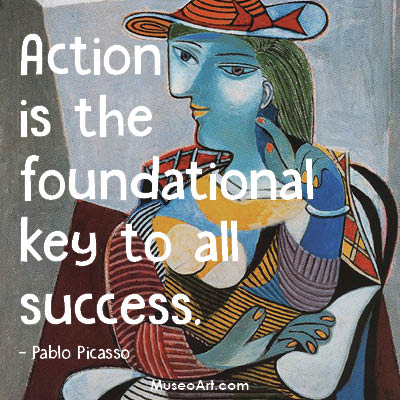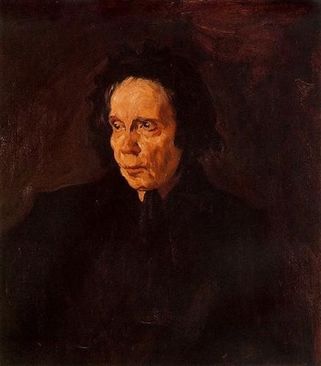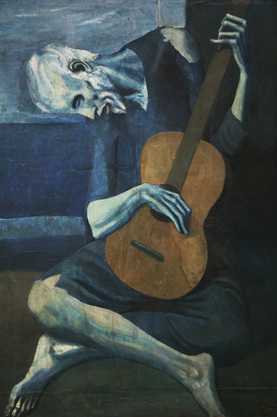|
Pablo Picasso, arguably 20th century's most important artistic figure and one of the most popular artists of all time, can make his success look easy. Picasso didn't start out painting in the cubism style that he is known for today, but throughout his life, moved effortlessly between an incredible range of styles, making him well-respected in his lifetime (unlike many other, less fortunate artists, such as Van Gogh who was mostly ignored throughout his painting career). By age 14, young Pablo was already turning out impressive realism paintings, like the "Portrait of Aunt Pepa" (below), said by Juan-Edwardo Cirlot to be "without a doubt one of the greatest in the whole history of Spanish painting." Again, this is a painting by a FOURTEEN year-old.
Clearly an artist soaking in talent from birth, Picasso was not lacking in confidence in his own abilities; he is quoted as saying, "My mother said to me, 'If you are a soldier, you will become a general. If you are a monk, you will become the Pope.' Instead, I was a painter, and became Picasso."
But Picasso doesn't only credit his superior talent or skill. Dedicated whole-heatedly to his art, many of his quotes directly credit the importance of hard work in a creative field, like the featured one at the top of this blog. He is also credited with saying the following: "Inspiration exists, but it has to find us working." "Only put off until tomorrow what you are willing to die having left undone." "Work is a necessity for man. Man invented the alarm clock." "I am always doing that which I cannot do, in order that I may learn how to do it." and "It took me four years to paint like Raphael, but a lifetime to paint like a child." Jumping forward to the 21st century, Malcom Gladwell's somewhat-recent book, "Outliers," examines the factors that contribute to high levels of success, studying cases from pro ice-hockey players in Canada, to the Beatles to Bill Gates. He concludes in the book that geniuses are not simply born into existence, but they are made through a combination of lucky circumstances and a massive amount of time and effort practicing the skill. What were Picasso's "lucky circumstances"? First of all, he was born into an artistic family; his father was a painter and professor of art who recognized Picasso's skill and gave him ample amount of time and instruction until the student surpassed the master. His father then convinced the School of Fine Arts in Barcelona (where he was a professor) to let 13 year-old Picasso take an entry exam to be enrolled into the advanced class. Picasso was admitted and by age 16, he was sent to Spain's premier art academy in Madrid, where he spent his days in and out of the art museums there, becoming familiar with Spain's earlier painters of El Greco and Francisco Goya.
But beyond all of Picasso's helpful life advantages, he worked hard to develop his skill, his creativity and to fight for his inspiration.
What's our #MondayMotivation lesson here? Even one of the most gifted artists of all time worked his skill to the bone. Picasso became Picasso not simply because of who his father was, or where he went to school, but because of his intense dedication and passion for his art. Are you not where you want to be yet? Recognize your own lucky circumstances and work your skill to the bone; don't wait for opportunities to come, but as the master says, "Action is the fundamental key to all success." Get out there this week and ACT on your goals, friends! Sources: http://www.pablopicasso.org/ http://www.metmuseum.org/toah/hd/pica/hd_pica.htm http://www.biography.com/people/pablo-picasso-9440021 http://www.brainyquote.com/quotes/authors/p/pablo_picasso.html Comments are closed.
|
MUSEO blogSharing our love of art education, one post at a time. Categories
All
|




 RSS Feed
RSS Feed